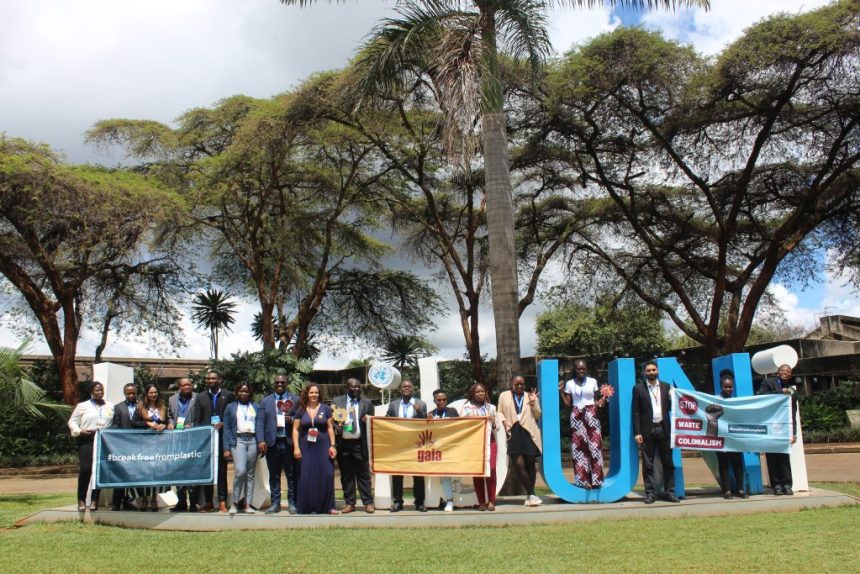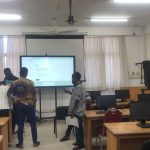The third session of the Intergovernmental Negotiating Committee on developing a legally binding instrument on plastic pollution (INC3) in Nairobi, Kenya, revealed the “serpent under the innocent flower.”
Before becoming a playground for bad-faith negotiators, greased hands and geopolitical tactics, attendees of the INC3 were called to welcome and embrace the spirit of Nairobi, by his excellency William Ruto, INC Executive Secretary Jyothi Mathur-filipp and Executive Director Inger Andersen, since this was the home where we got the mandate for the world’s first plastics treaty. They highlighted the urgency for an ambitious Global Plastics Treaty, recognizing that plastics places our own health at risk, flowing in our bloodstream and accumulating in our organs. They reinforced the mandate of the UNEA Resolution, which is based on a comprehensive approach that addresses the full life cycle of plastic, from polymer to production and disposal. They acknowledged that recycling and waste management practices alone will not be sufficient to address this triple planetary crisis. Africa was called to lead the way with Rwanda and Kenya, who have successfully demonstrated that plastic reduction and innovation is possible through collective action.
We were urged by the INC chair to optimise the time that we have in Nairobi and engage in substantive discussions that will progress us to a mandate for the first draft of the treaty text by INC4 and pave a clear road map on intersessional work.
The outcome was far from what well-meaning negotiators and activists anticipated. After the first reading of the Zero Draft, which, in the view of many, was a well-balanced document that captured the full suite of views and positions expressed by countries at the previous 2 INCs and could serve as the basis of the negotiations, a newly formed group of ‘like-minded’ (also called ‘Global Coalition for Plastics Sustainability’) plastic-producing countries were set on challenging the Zero Draft, revealing a deep divide among countries present.
Their mandate was clear, to hold the negotiations hostage under the guise that their positions were not reflected in the Zero Draft. These countries have repeatedly sought to delay progress within the negotiations, pushing a waste management focus and rejecting work on the upstream part of the plastic pollution issue. This is in stark contradiction to the clear, comprehensive, and ambitious mandate established by the world at UNEA 5.2, which aims at covering the entire life cycle of plastic. It must be emphasised that at the outset, countries were presented with a zero draft that offered options from ambitious provisions such as reductions in primary plastic polymer production and bans on toxic chemicals to voluntary and weaker measures. The intent was to provide a framework for negotiation, allowing countries to tailor the treaty to their specific needs. Yet, despite the majority of national governments expressing a desire and eagerness to make meaningful progress before the 2024 deadline, the small group of nations, operating under the vague label of “like-minded countries,” and under the influence of their vested petrochemical interests, chose obstruction over negotiation.
This obstructionist strategy, characterised by complaints and attacks on the negotiation process, including, in some instances, disguised attacks on facilitators of contact groups, hindered the critical task of finalising the first draft of the treaty text. The obstructionist approach not only stalled progress but also raised concerns about the commitment of certain nations to sincerely address the plastic pollution crisis. However, it did not come as a surprise that these countries would once again try to block discussions on substantive matters since the halls of INC3 lurked with the predatory interests of more than 143 fossil fuel and chemical industry lobbyists – a 36% increase from INC2.
Amid the hostility, the African Group of Negotiators and Pacific Small Island Developing States (PSIDS), stood upright and firm against the bullying and bad faith obstructionism, representing the voice of the collective conscience. Their statements remained courageous, notably from nations like Samoa, Palau, Angola, and Rwanda, who demonstrated unwavering ambition for a robust treaty that covers the entire life cycle of plastics and strongly supported provisions on addressing plastic production, chemicals of concern, protecting human and environmental health, as well as human rights, recognising the importance of Indigenous Peoples’ knowledge, and defining the path for a just transition where the recognition of waste picker’s rights are prioritised. Members of the African Group remain consistent and steadfast in the outcomes of the plastics treaty, upholding their previous decisions and positions that serve to protect the health of the people and the environment.
Despite the efforts by these nations to salvage the 3rd round of negotiations, a critical point was reached, and the failure to agree on the scope and format for intersessional work signalled a rupture in the process. Under normal circumstances, the standard protocol would call for continued negotiation until a compromise was found. However, the breakdown in trust reached a point where parties were unwilling to engage in further discussions. The high-ambition countries seemed to have reached their limit, while oil-producing nations shamelessly obstructed the process.
The United States attempted a last-minute manoeuvre to restart the contact group to agree on a mandate for intersessional work, but opposition from Saudi Arabia and Russia blocked any compromise, claiming the matter had been settled and must not be reopened. Delegates, shocked, frustrated, and realising the bad hand they had just been dealt by members of the “like-minded fraternity”, fumed in anguish, recognising an absolutely avoidable waste of the next 5 months between negotiating time until INC4.
Despite the disarray, the week did yield some positive developments. The concept of “Just Transition” gained traction thanks to the advocacy of waste pickers and indigenous peoples. Initially met with suspicion, their demands for recognition, inclusion, and a well-supported transition won over many nations, transforming them into advocates for this cause. Waste pickers are now more than ever being recognised as an essential part of the treaty.
African countries, together with their counterparts from the PSIDS, have become the much-needed moral compass in this process, with Angola (notably) calling for a halt in the delay tactics and getting to work on the treaty. This underscores the narrative that those who are at the receiving end of plastic waste (the global south) have a higher stake in negotiations, and if the treaty process comes to nought, we in the global south will keep being colonised by waste.
Knowing that every passing second is crucial and a failure to deliver a treaty by the end of 2024 will mean respect for human rights and the rights of people to a clean and healthy environment in the Global South particularly Africa, will be postponed, or even worse kicked to the curb. “Will parties take the bold decision of implementing a strong conflict of interest policy and stand up to the few countries who have no intention of negotiating a robust treaty, or will they keep playing into the hands of the “like-minded” group who keep profiting off oil and gas proliferation?”
With a revised bloated Zero Draft where all options and even no options remain on the table as opposed to a first treaty draft text and with no mandate for intersessional work, we went from a balance to a state of entropy which will make the next round of negotiations at INC4 in Canada, challenging for a milder use of the word. We can expect to see informal intersessional work cropping up that is predicted to be exclusionary and with potentially under-handed mandates.
Expert Panelists at the Global South Media Briefing, 14 November, 2023.
INC 4 will prove if member states will uphold the obligations to their citizens and pursue a treaty that prioritises human rights.
In closing, It is also important to acknowledge members’ advocacy efforts even well before INC3 in the form of: Ministerial briefings, powerful interventions at INC3, calls to action by the youth, defending the rights of the Global South to tackle the plastic crisis and raising awareness about the challenges confronted by waste pickers to underscore the importance of a just transition as part of the plastics treaty.
While the battle is far from over, GAIA Africa members will continue to hold the leaders of Africa to a strong and ambitious plastics treaty by demanding:
- Global plastic production reduction that starts with the measures that can deliver a phasedown of plastic production to sustainable levels compatible with human health, human rights and the environment through the development of global, legally binding, production freeze and phasedown targets by a specific point in time.
- Identification and regulation of toxic and hazardous chemicals and monomers/oligomers/polymers of concern.
- Guaranteed inclusion, integration, just transition and accessibility of waste pickers and frontline communities into national waste management policies and the Global Plastics Treaty process.
- Harmonised standards and guidelines for environmentally sound plastic waste management.
- End of waste colonialism and dumping on the African continent.
- Strengthened standards and guidelines for EPR (Extended Producer Responsibility) that are mandatory, integrates waste pickers and other waste workers and respects the waste hierarchy by prioritising reuse over recycling.
- Robust financial mechanism to support the effective Implementation of the treaty.
- Support for the Institution of a Dedicated Global Scientific body for the treaty.
- Prohibition of dangerous practices such as open burning, incineration, firing in coal-fired power plants and other waste-to-energy processes, co-processing in cement kilns, and chemical recycling to protect human health and the environment.
For more on these demands you can read further here.




